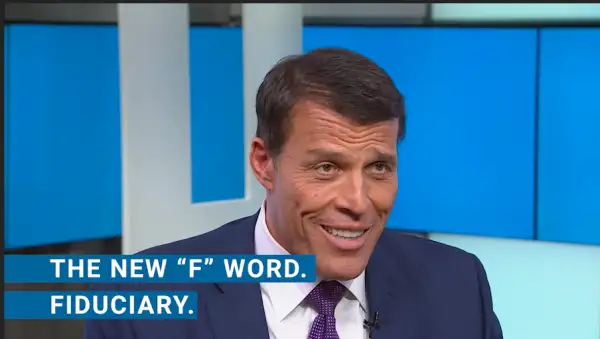The 'Disgusting' Financial Practice Tony Robbins Wants You to Watch Out For
Money is not a client of any investment adviser featured on this page. The information provided on this page is for educational purposes only and is not intended as investment advice. Money does not offer advisory services.

It sounds simple enough: Make an investment adviser put the interests of his or her clients ahead of his own.
But the rollout of the so-called fiduciary rule, approved by the Department of Labor during the Obama administration, continues to be delayed, as it faces fierce opposition from the financial industry.
For author and business strategist Tony Robbins, this lack of regulation around investment advice can be “disgusting.”
In some cases, Robbins said, advisors are dual-registered as both fiduciaries and brokers, making it unclear whether they are obligated to act only in their clients' best interest. “They tell you what funds to get, but it’s really their funds, and they’re getting a chunk of money out of it, which means you’re making less. It’s disgusting,” Robbins said in a recent interview with Money.
Robbins is known for his motivational speaking, but he has been a longtime follower of the markets. His new book Unshakeable is a compendium of the investment advice he has received from some of the best minds on Wall Street. The aim of the book, he said, is to make the average investor feel confident in their finances — and aware of the traps that that could undermine them.
The delay on the fiduciary rule is a prime example of the ways he said investing professionals are not always on their client’s side.
“Your lawyer is required by law to be a fiduciary — they have to put your needs ahead of their own. If [someone] finds out otherwise, they’re going to be disbarred,” he said. “Same thing for medical doctors. In the U.K., in Australia, in many countries, financial advisers have to put your needs ahead of their own.”
But America is “unique,” Robbins said.
For decades, many advisers have taken advantage of this loophole by charging excessive fees, or pushing investment products that give them commissions their clients may not be aware their adviser is receiving. As a result, investors have collectively been losing out on $17 billion a year, according to Obama administration estimates.
The financial industry has responded in part by saying that a “buyer beware” mentality should prevail, and that everything an investor must know is already in the fine print.
But Robbins noted they are written in a way that the average person would find incomprehensible.
“If you’re a PhD in finance, maybe you can figure them out,” he said.
71% of Americans think they pay nothing for their 401(k), according to a 2011 study by the AARP. And 92% of those who know they’re being charged something, don’t know what they’re being charged, NerdWallet found.
Yet the financial industry remains staunchly opposed to the fiduciary rule. Money has documented the lengths it has gone to block the rule from being implemented: commissioning studies, creating websites that send form letters to Congress, and making donations directly to members of Congress whom they believe they can turn on the issue.
And their efforts seem to have worked: Acting on a directive of the Trump administration, the Labor Department has announced it is postponing the rule going into effect until June 9.
Leading the administration’s opposition is former Goldman Sachs No. 2 Gary Cohn, who is now director of the White House National Economic Council.
"They thought they were trying to protect investors in their retirement accounts. But by 'protecting investors,' they highly limited their choices," Cohn said on CNBC’s "Squawk on the Street" in February. "I don't think you protect investors by limiting choices."
"When you're trying to encourage younger and younger people to invest for a longer period of time, you need to give them the proper choices that will allow them to accumulate wealth for a long period of time."
Robbins is now pessimistic that the rule will survive in a way to truly protects investors. So he is now arguing that investors must take measures to protect themselves.
“Even if you did put it in, [it] really probably is not going to do what the original intention was because all of the people that try to influence legislation in the industry certainly hit it very hard and were pretty successful,” he said.
“What I think is more important is to educate the public so that they don't have to count on the government or sometimes a false sense of certainty lets your guard down.”